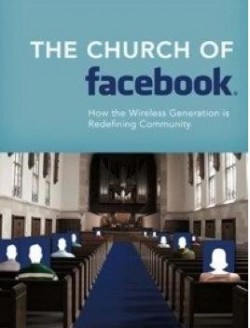How Facebook is Changing Churches
- Posted by: Todd
- Posted on: Mon, October 19, 2009
- Viewed 379
- (5) comments so far

A revolution is taking place, one profile at a time. Online social networks like Facebook and MySpace are connecting people like never before. With hundreds of millions of users, they’re creating almost limitless potential to redefine our personal worlds. It’s a movement that’s changing how we form relationships, perceive others, and shape our identity.
In his new book, The Church of Facebook (David C Cook, October 2009) author Jesse Rice takes a deeper look at the movement which, at its core, reflects our need for community. “Our longing for intimacy, connection, and a place to belong has never been a secret, but social networking offers us a new perspective on the way we engage our community,” Rice states. This new perspective raises new questions: How do these networks impact our relationships? In what ways are they shaping the way we think of ourselves? And how might this phenomenon subtly reflect a God who longs to connect with each one of us?
The Church of Facebook explores these ideas and much more, offering a revealing look at the wildly popular world of online social networking. “The new landscape of social networking tells us two basic things: One, we have a deep desire to be known. And, two, we are faced with a technology that both enables and hinders the intimacy we’re looking for,” Rice says. From personal profiles to status updates, author Jesse Rice takes a thoroughly entertaining and insightful look into what Facebook reveals about us, and what it may mean for the future of “community.”
Social networking is no fad; it has become a fact of life, especially for teens and twenty-somethings. The Church of Facebook is essential reading for parents and pastors who want to understand this trend and its impact on their children and congregations. Rice’s discussions will engage social networkers of all ages and stages who are wrestling with the very real issues of identity, meaning, purpose, and friendship within the context of virtual communities.
Comments
if you want a Globally Recognized Avatar (the images next to your profile) get them here. Once you sign up, they will displayed on any website that supports them.






Matt @ The Church of No People on Mon, October 19, 2009
A lot of people feel disconnected from the church - like they have no relationships within the body. I don’t really see Facebook improving this situation. I have dozens of friend requests from people I have to scratch my head and ask myself, ‘Do I know you?’
Sounds like a good read.
Gary F. Patton on Sun, October 25, 2009
�The new landscape of social networking tells us two basic things: One, we have a deep desire to be known. And, two, we are faced with a technology that both enables and hinders the intimacy we�re looking for,� Rice says.
You hear a strong “What?” from me on both points.
The first would be a wise battle cry to the face-to-face Body of Christ that asks: “What have we done wrong that people don’t feel “known enough” here that they have to go elsewhere to feel so and find community?”
The second would be a wise warning to those who are avoiding true intimacy and personal interaction by kidding themselves that FaceBook, MySpace and Twitter can truly be “‘intimate’ gatherings” or “community” as Jesus talks about both.
Blessings church!
Gary In Toronto
David on Tue, October 27, 2009
Utilizing facebook and twitter has opened up opportunities for the gospel with people that I wouldn’t normally have connected with. I have had chances to pray with and for people, counsel someone facing divorce, and engage in apologetics.
It is in no way a substitute for real interaction with people, and it can consume too much time. But used wisely it can build connections to people and create meaningful interactions.
Just because social networking represents a new medium of communication does not mean that we should react with fear and trepidation. This reaction is quite common and has been present at the mediums, especially any form of mass communication. Print, Radio, TV, Internet have all changed the way in which humans communicate and transfer information. Social networking will do the same thing. I think we as the church should not fear it and run and hide, but rather should seek to use it to God’s glory as best as we can. Much the way we have done with other forms or communication.
Just because Jesus didn’t use it doesn’t mean that he wouldn’t have used it if it had been available. Any argument along those lines is an argument from silence and an expression of ones opinion not a statement of fact.
garyFPatton on Tue, October 27, 2009
Beautifully, compellingly and lovingly said, David!
Well doe!!
Gary In Toronto
Shawn on Sat, October 31, 2009
Well said David. I had that conversation with a FB naysayer just the other day. For thousands of years people have communicated over great distances through written language. What the internet and social media have done is shorten the time it takes for that communication to travel.
Yes, there is a lot of junk to do on FB that is non-productive and will suck time from you, your family, and your ministry. But as a means of connecting with others, it is an amazingly efficient tool.
Page 1 of 1 pages
Post a Comment